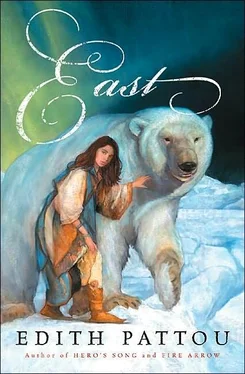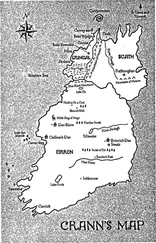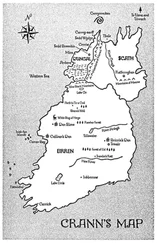Edith Pattou - East
Здесь есть возможность читать онлайн «Edith Pattou - East» весь текст электронной книги совершенно бесплатно (целиком полную версию без сокращений). В некоторых случаях можно слушать аудио, скачать через торрент в формате fb2 и присутствует краткое содержание. Год выпуска: 2002, ISBN: 2002, Издательство: Graphia, Жанр: Старинная литература, на английском языке. Описание произведения, (предисловие) а так же отзывы посетителей доступны на портале библиотеки ЛибКат.
- Название:East
- Автор:
- Издательство:Graphia
- Жанр:
- Год:2002
- ISBN:9780756950545
- Рейтинг книги:3 / 5. Голосов: 2
-
Избранное:Добавить в избранное
- Отзывы:
-
Ваша оценка:
- 60
- 1
- 2
- 3
- 4
- 5
East: краткое содержание, описание и аннотация
Предлагаем к чтению аннотацию, описание, краткое содержание или предисловие (зависит от того, что написал сам автор книги «East»). Если вы не нашли необходимую информацию о книге — напишите в комментариях, мы постараемся отыскать её.
East — читать онлайн бесплатно полную книгу (весь текст) целиком
Ниже представлен текст книги, разбитый по страницам. Система сохранения места последней прочитанной страницы, позволяет с удобством читать онлайн бесплатно книгу «East», без необходимости каждый раз заново искать на чём Вы остановились. Поставьте закладку, и сможете в любой момент перейти на страницу, на которой закончили чтение.
Интервал:
Закладка:
"Your wind rose," I said.
"Yes, Father. I hope you do not mind that I copied it."
"Of course not. It is..." I faltered, suddenly realizing that the lie was there, too. Unknowing, Rose had woven the lie into her cloak.
I began speaking again, expressing my admiration for her artistry. I think Rose sensed something, though, for I felt her puzzled glance on me several times as everyone gathered around to exclaim over the cloak. Eugenia prepared a special meal that night, scraping together what she could from our sparse larder, in honor of Rose's accomplishment.
I think that day, the day Rose brought home the cloak, was the last our family knew of happiness. She was almost fifteen years old then, but we had been suffering ill luck for a long time, since the year she was born. Occasionally the thought would cross my mind that our "luck" had been affected by the lie of Rose's birth, but I would quickly berate myself for being as superstitious as Eugenia.
I was not cut out to be a farmer. When we first moved from Bergen to the farm, we were fortunate, but when things went poorly, my decisions made them go still worse. By the autumn when Rose finished her cloak, we were barely scraping by and my children knew more of hunger than I could sometimes endure.
One of the factors that had contributed mightily to our reversal of fortunes was the fact that Eugenia's cousin, who had fallen on hard times of his own, had been forced to sell all his landholdings. Our farm had been purchased by a prosperous merchant who lived a distance away, in the city of Oslo. It was more than a month's journey by horse to Oslo, and thus we never saw the merchant, nor even heard directly from him. All of our communications came by messenger from the merchant's deputy, a man called Mogens. Our rent did not go up right away, but slowly, over time, it did rise, and eventually the rent was nearly equal to what we could produce, with very little left for us. Over the years our two eldest children left the farm. Nils Erlend set out for Danemark, where he hoped to make his way, and Selme Eva married an ironworker and moved with him to a village in Njord far distant from us. We rarely heard from either of them.
The day after Rose brought home her cloak, we'received a final blow. A letter arrived from Mogens saying that due to lack of payment of rent, we must vacate the farm in less than a month.
Except for the cousin who had originally owned the farm and Eugenia's sister, who had emigrated to Iseland after her husband deserted her, there was no one left alive in Eugenia's family. We would not have considered burdening our two eldest children with the dire news, especially since neither of them was doing much more than getting by. The only people we could turn to were my family.
With a heavy heart I composed a letter to my brother, who ran the family farm. I was not at all sure he would take us in, for we had fallen out of touch many years earlier. Even if he did take pity on us, it was a long journey to the place where I grew up in central Njord, and I worried that we would not even have the wherewithal to undertake it. We had already sold the wagon and all the remaining farm animals just to cover our debt to the man who owned the farm.
But as I looked upon the gaunt faces and worn, frayed clothing of my family, I knew there was no other choice.
There were moments during those dark days when I was lost in despair. I believed myself to be a failure as a husband and a father, and was submerged in the guilt of what I had brought my family to. I even thought of ending my own life.
Eugenia was my anchor then. Despite her superstitious notions, she was a strong and loyal woman, and it was she who kept us all together and alive in a way that was truly remarkable. Never did she blame or castigate me, or rail against her fate. Somehow she made every spoonful of food stretch to two, and found ways to make even the most threadbare of clothing serve.
It is also true that she was wont to come up with tortured reasons, based on superstition, for why our fortunes had turned so ill. Still, she stolidly shouldered the burden of our poverty and kept us going.
Then Sara, our third eldest, fell ill.
Neddy
WHEN SARA GOT SICK I saw the fear come into Mother. Up until then she had been calm and steady. But I knew that Sara's sickness brought back to her (and to Father) the memory of Elise's death.
There were five of us children living at home then. Myself, Rose, Sara, Sonja, and Willem.
We had been waiting to hear back from Father's brother, who was our only hope at the time. But it became clear that even if he agreed to take us in, we would not be able to make the journey, not with Sara so ill.
Thankfully, our neighbor Torsk offered us a temporary home so that we would not be without shelter when the landowner came to evict us. But Torsk had also been hard hit by the weather, though he at least owned his own farm. And we knew we could not strain his meager resources by staying too long.
I had made up my own mind that, like my oldest brother, Nils, I would leave home and seek a way to earn my living. I would then send all I earned back to my family. My long held dream of one day studying with scholars in one of the big cities was gone.
Mother was with Sara constantly, completely unmindful of her own comfort and health. Father wandered around the farmhold in a daze, looking as though he had aged twenty years. We had little more than a fortnight before we had to leave the farm.
The cold hit early that autumn. This was the last blow in a series of terrible setbacks. We had been slammed with an early blizzard before the last harvest (what there was of it) could be gathered. I think we were numb by then, lacking even the spirit to lament our misfortunes. It warmed enough several days later to melt the snow, but the damage had been done. What had followed then was our typical autumn weather—a succession of blustery, chilly rainstorms.
It was during just such a storm-drenched night, as we huddled around the hearth, that we heard a scratching sound coming from our front door. Mother was at the far end of the great room, sitting by Sara, who had just fallen into a fitful sleep.
The sound came again, and after exchanging a look with Father, I went to the door and cautiously opened it a crack, wondering who or what could be out on such a night.
All I saw was a white blur before the door was flung wide. I stepped back and something large and wet brushed by me.
I turned to stare at an enormous white bear standing in the middle of the great room.
The wind howled in, spewing cold rain, but we were unaware of it.
"Close the door." It was a massive, strange voice. And though it seemed impossible, I knew at once the voice was coming from the white bear.
My sister Sonja swayed and looked like she might faint. I moved to her quickly, putting an arm around her shoulders. She was trembling.
Rose went to the door and shut it.
It was like a dream, gazing at the immense animal that had entered our home. Standing erect on all four feet, he was as tall as me, and water dripped off him onto the wooden floor. And I remembered water dripping off white fur from long ago.
I guessed from the moment he brushed by me that this was the white bear I had seen as a child, the one that had saved my sister Rose. If I had had any doubts, they were dispelled when I looked into those black eyes. It was the same bear. And I was filled with a terrible foreboding.
He gazed around the room, from one to the other of us. His eyes stayed longest on Rose. Then he turned to Father.
"If you will give me your youngest daughter..." The eerie huge voice echoed in the room. He spoke slowly, pausing between each word, as if the act of speaking was difficult, almost painful for him. "Then the one who lies near death will be made well again. And you will be no longer poor but wealthy, and will live in comfort and ease."
Читать дальшеИнтервал:
Закладка:
Похожие книги на «East»
Представляем Вашему вниманию похожие книги на «East» списком для выбора. Мы отобрали схожую по названию и смыслу литературу в надежде предоставить читателям больше вариантов отыскать новые, интересные, ещё непрочитанные произведения.
Обсуждение, отзывы о книге «East» и просто собственные мнения читателей. Оставьте ваши комментарии, напишите, что Вы думаете о произведении, его смысле или главных героях. Укажите что конкретно понравилось, а что нет, и почему Вы так считаете.












